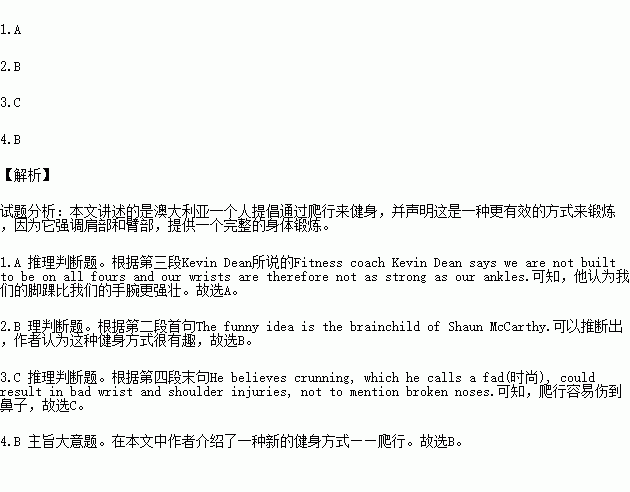题目内容
Every few years comes a fitness trend that has people scratching their heads in amazement. “Crunning” will probably be one of them. The “c” stands for “crawling”(爬行). This new sport needs two-legged humans running on all fours!
The funny idea is the brainchild of Shaun McCarthy. The 34-year-old is convinced that it will revolutionize fitness as we know it. According to the sports enthusiast, “The only thing that crunning’s changed about fitness is that it’s changed everything about fitness.”
Mccarthy has no scientific evidence to prove that crunning is more efficient than traditional two-legged running. However, he believes it is a more effective way to exercise because it puts an emphasis on the shoulders and arms, providing a complete body workout. Mccarthy also says crunning seems to tire him out more. He therefore concludes that the unconventional exercise is a bigger calorie burner than normal running.
While experts generally agree that crunning may provide a better workout, many are not sure if it is the right exercise for humans. Fitness coach Kevin Dean says we are not built to be on all fours and our wrists are therefore not as strong as our ankles. He believes crunning, which he calls a fad(时尚), could result in bad wrist and shoulder injuries, not to mention broken noses.
But McCarthy is not worried. Since the release of his crunning video a few weeks ago, many Melbourne residents have been seen scampering around on all fours. As it turns out they are not the only ones. In the Chinese city of Zhengzhou, crawling, a much slower version of crunning, has been a favorite activity for many years. According to some enthusiasts, the light exercise that is believed to date back two thousand years to the Han Dynasty, is good for curing back and spine ailments.
Ready to give crunning try? Then Mccarthy recommends investing in some good shoes, hardy gloves and most important of all, a face mask!
1.What can we learn about crawling according to Kevin Dean?
A. Our ankles are stronger than our wrists.
B. Crawling is an efficient way to work out.
C. The city of Zhengzhou is the origin of crawling.
D. Crawling can burn more calories than normal running.
2.What does the author think of crunning?
A. Dangerous. B. Interesting.
C. Beneficial. D. Unbelievable.
3.Why does McCarthy suggest people wearing a face mask when crunning?
A. To amuse other people.
B. To avoid being recognized.
C. To protect the nose from being injured.
D. To prevent sweat dropping on the ground.
4.What is the text mainly about?
A. A new way of crawling.
B. A new trend of exercising.
C. A scientific discovery.
D. A traditional way to keep fit.

